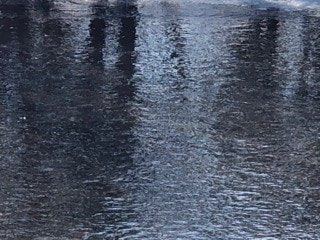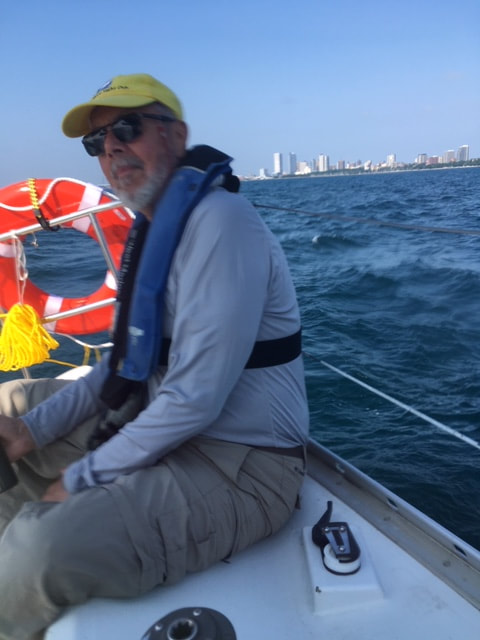I can’t deny that I am frightened for the future of our country. The President acts as if he is above the law, while his party members cower and watch muted as the Constitution becomes a meaningless piece of parchment. And at the same time, the Democrats seem in disarray, hoping to find a candidate who will heal our divisions.
I know I’m not alone in my fear, but the adage that “misery loves company” doesn’t seem to apply. The fact that so many of my friends have the same sense of angst provides no solace. In former times, I could find peace in prayer. I used to believe that the Divine had a plan for me, and for the unfolding of the universe. If the world got too scary, I could wrap myself in the warm blanket of God’s love with the faith that all would be fine because everything was destined for God’s greater good. My faith is as strong now as ever before. What has changed, is my belief about what God is and how the Spirit engages with the world. Growing up Catholic, I perceived God as Omniscient, Omnipresent, and Omnipotent: that God knew everything, was ever-present and was all powerful. That’s not what I believe anymore, and as a result the world has become a more unsettling place. I no longer imagine the Divine as a life guard who will save us if we venture too far astray. We are left pretty much on our own, but not in a – God doesn’t exist – kind of way. We are left on our own, because we are how the Spirit moves in the world. The Divine is our inward teacher who pulls, prods, whispers, and maybe even goads us into becoming agents of peace and justice. If we don’t act to bring about the kingdom of God, then it won’t come about. But, knowing that I must take my part in the unfolding of the kingdom doesn’t solve the problem of a country that is seemingly spinning toward chaos. Being an old community organizer, I know that people in power only act when confronted with a countervailing power. And, that lack of power on the part of everyday people is the primary reason why we don’t see urgency around important issues like climate change or gun control; two of many concerns that have significant support within the US population. And so, here is my dilemma: I can’t pray for change, because I’m the answer to my own prayers. I can write letters to my elected officials and support a protest here and there – but I don’t see how that changes the power dynamics and brings about the systemic change we need. I can certainly vote and work for candidates who align with my values, but at this juncture that seems like a crap shoot. So, what am I to do? Theodore Parker wrote a paper in 1853 from which he is credited for the famous quote: “The arc of the moral universe is long, but it bends towards justice.” That may well be true and provides some guidance. A few argue that we are now living in the most peaceful time known to our species. While democracy across the world is teetering, the long sweep of history demonstrates that humankind does indeed march toward a greater good. Said another way: if goodness and light rests within the soul of each person, then the call towards goodness is unending. I see that in our own Meeting for Worship. Often, I will feel a tug to stand and speak a message I hear from within. But out of timidity or caution I hold back, only to see another Friend stand and deliver the same message I was pondering. I have been shown – time and again – that the voice of God will not be stilled. If one person hears but does not act, another will both hear and act. I have now come to see that the voice of the Divine is an eternal call for peace and love. When we heed that call, we take but one step in the long march of history towards building the kingdom of God. Thus, all who are troubled, like me, can take solace knowing: That God at their fountains Far off hath been raining
0 Comments
One reason I began thinking about becoming a Quaker was because of the group’s reputation for action on social justice. It wasn’t until I became steeped in Quaker practice that I understood how our work for justice emanates directly from our dedication to contemplation. And, how the movement of the Spirit in our hearts leads us to become the heart and hands and voice of the Divine in the world. This Quaker sense of integrating contemplation and social action is the focus of a book and an article, reviewed below.
Richard Rohr is a Franciscan priest and a leader at the Center for Action and Contemplation. In his February 8, 2020 daily meditation (1) Rohr provides an observation about the outsized social justice impact that our relatively small group of Quakers has had over time. Rohr relates how “ (Quaker) actions—grounded in contemplation—have had a profound impact, helping to abolish slavery, promote gender equity, and reform prisons and other institutions. “ In this reflection, Rohr goes on to quote from a book by author, Stephan Schwartz (2) “How could this small group of people create movements that ultimately involve millions, tens of millions? This is a tiny group whose beingness is so powerful that enough people personally change their choices so that the desired change becomes society’s new norm. In studying the histories of these great social transformations, eight laws…begin to emerge. . . . Taken together, they reveal how individual choice linked in consensus becomes the strategy of beingness that creates change. Adherence to these Eight Laws is not the unique domain of Quakers, of course. But in their efforts, it can be clearly seen. “ Here are the laws: First Law. The individuals, individually, and the group, collectively, must share a common intention. Second Law. The individuals and the group may have goals, but they may not have cherished outcomes. Third Law. The individuals in the group must accept that their goals may not be reached in their lifetimes and be okay with this. Fourth Law. The individuals in the group must accept that they may not get either credit or acknowledgment for what they have done and be authentically okay with this. Fifth Law. Each person in the group, regardless of gender, religion, race, or culture, must enjoy fundamental equality, even as the various roles in the hierarchy of the effort are respected. Sixth Law. The individuals in the group must foreswear violence in word, act, or thought. Seventh Law. The individuals in the group and the group itself must make their private selves consistent with their public postures. Eighth Law. The individuals in the group and the group collectively must always act from the beingness of life-affirming integrity. I surmise that many of my Quaker Friends would bristle at the idea of following 8 laws to achieve social justice in society. We aren’t a people accustomed to adhering to rote disciplines. At the same time, every one of my Quaker Friends would embrace the idea that our inward journey and our outward actions must align, and that often, our leadings bring us to a place of change that is both welcomed and uncomfortable. Listening to the voice of the Divine in our hearts and walking with integrity in the world while working for social justice is something – quite frankly – we could use more of today. And so, my dear Friends, please let us continue to let our lives speak. (1) Richard Rohr’s Daily Meditation – From the Center for Action and Contemplation – Summary: Week Five – Alternate Orthodoxy, February 2 – February 8, 2020. Practice: Eight Laws of Change (2)Stephan A. Schwartz, The 8 Laws of Change: How to Be an Agent of Personal and Social Transformation (Inner Traditions/Bear & Company: 2015), 17-18. |
AuthorMike Soika has been a community activist for more than 30 years working on issues of social and economic justice. His work for justice is anchored by his spiritual formation first as a Catholic and now as a Quaker. Pre 2018 Archives
|



 RSS Feed
RSS Feed
